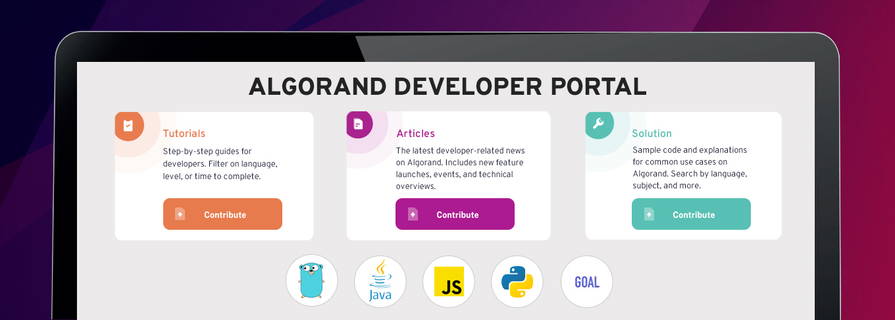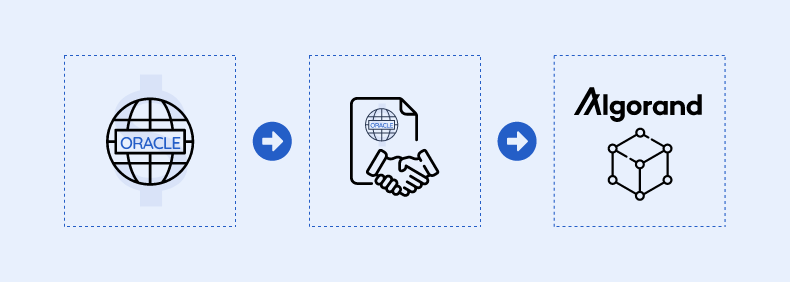file
Showing 220 posts related with file.
-
 Intermediate · 30 minutes
Intermediate · 30 minutesLimitOrder Contract with Go
A walkthrough example of how to use a limit order contract with Go.
-
 Beginner · 15 minutes or less
Beginner · 15 minutes or lessSetting the Transaction Fee in JavaScript
Setting Transaction Fee with Javascipt
-
 Beginner · 1 hour +
Beginner · 1 hour +Deploying Sandbox to a Linux VM in Azure
This tutorial demonstrates how to deploy a Sandbox development environment to a linux virtual machine in Azure. It tackles in great detail how to navigate Azure, but also provides an easy-to-use template for those with Azure experience.
-
 Beginner · 1 hour
Beginner · 1 hourWorking with ASA using Java
This tutorial demonstrates the steps involved in creating a basic Algorand Standard Asset using Java.
-
 Beginner · 1 hour
Beginner · 1 hourWorking with ASA using Go
This tutorial demonstrates the steps involved in creating a basic Algorand Standard Asset using Go
-
 Beginner · 15 minutes or less
Beginner · 15 minutes or lessTest your Algorand ORE ID Integration
Testing your ORE ID app setup can be done easily on the developer dashboard. This includes testing your app’s account creation using any of the Oauth platforms, and signing transactions and can be done on both test and production apps.
-
 Beginner · 15 minutes or less
Beginner · 15 minutes or lessGetting Started with the PureStake API Service
Get up-and-running on the Algorand network without needing to run your own node.
-
 Intermediate · 1 hour +
Intermediate · 1 hour +Milestone Dapp Built with Pyteal
We will build a decentralized milestone based application using pyteal and Python. PyTeal is used to write the smart contracts whereas interacting with them is done via Python using the `py-algorand-sdk`.
-

PyTeal — Writing Algorand Smart Contracts in Python
PyTeal is a python language binding for Algorand Smart Contracts (ASC) that abstracts away the complexities in writing smart contracts. PyTeal is provided as an open-source tool for the Algorand community. We invite you to try, use, and contribute to PyTeal if you are interested in developing and deploying ASC’s in Python.
-

Welcome to the Algorand Developer Portal
The new Algorand Developer Portal provides resources for developers to turn their ideas into full-scale applications. Browse and search across new content, like Tutorials and Solutions. Access technical documentation. Stay up-to-date on the latest features.
-

Contribute to the Algorand Community and Earn Rewards
Last week we launched our new Developer Portal, with significant improvements to how developers can learn to use and implement applications on the Algorand blockchain. We are looking for developers to help us expand the content on this site, and the Algorand Foundation is rewarding those who do!
-

Getting Started with Assets
Creating an asset is simply a type of transaction on Algorand. There is no contract code required. Here are five ways to get started developing with Algorand Standard Assets.
-

What's New: Algorand v2.0.7
Algorand v2.0.7 was released to MainNet and TestNet, accompanied by a new set of features in the Algorand APIs. Learn more about what's new in this article.
-

Leased Transactions: Securing Advanced Smart Contract Design
Certain smart contracts can benefit from defining a Lease parameter, which can provide security for exclusive transaction execution, mitigate fee variability, and enable long-running smart contracts. Learn when and how to use Leases in this article.
-

TEAL ALGO Oracle in Algorand Layer-1
In a blockchain, the ability to reference a price on-chain enables a seamless and trustless transaction environment, especially for automated transactions and smart contracts. Oracles are the entities in charge of broadcasting off-chain data such as market price to the blockchain, and serve as a source of truth that allows on-chain dApps to measure the value of assets referenced within a transaction. Rand Labs and Borderless Capital releases a Algorand Oracle that can be referenced in atomic transfers using TEAL stateful and stateless smart contracts.
-

Linking Algorand Stateful and Stateless Smart Contracts
This article discussing linking stateful and stateless smart contracts and why it makes sense in many applications.
-

From Algos to ASAs
This guide maps core technical concepts related to the Algo to Algorand Standard Assets, which is Algorand's Layer-1 implementation for third-party fungible and non-fungible tokens.
-

Reach - The Easiest and Safest way to Build DApps
Blockchain development is hard. Existing tooling is complex, time-consuming to use and not robust against common programming oversights. Reach is fundamentally changing the way blockchain developers approach their craft, safely, efficiently and with formal proofs.